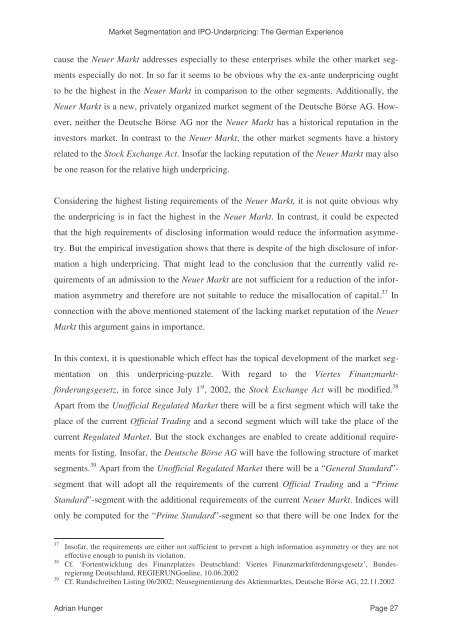Market Segmentation and IPO-Underpricing: The German Experience
Market Segmentation and IPO-Underpricing: The German Experience
Market Segmentation and IPO-Underpricing: The German Experience
You also want an ePaper? Increase the reach of your titles
YUMPU automatically turns print PDFs into web optimized ePapers that Google loves.
<strong>Market</strong> <strong>Segmentation</strong> <strong>and</strong> <strong>IPO</strong>-<strong>Underpricing</strong>: <strong>The</strong> <strong>German</strong> <strong>Experience</strong><br />
cause the Neuer Markt addresses especially to these enterprises while the other market seg-<br />
ments especially do not. In so far it seems to be obvious why the ex-ante underpricing ought<br />
to be the highest in the Neuer Markt in comparison to the other segments. Additionally, the<br />
Neuer Markt is a new, privately organized market segment of the Deutsche Börse AG. How-<br />
ever, neither the Deutsche Börse AG nor the Neuer Markt has a historical reputation in the<br />
investors market. In contrast to the Neuer Markt, the other market segments have a history<br />
related to the Stock Exchange Act. Insofar the lacking reputation of the Neuer Markt may also<br />
be one reason for the relative high underpricing.<br />
Considering the highest listing requirements of the Neuer Markt, it is not quite obvious why<br />
the underpricing is in fact the highest in the Neuer Markt. In contrast, it could be expected<br />
that the high requirements of disclosing information would reduce the information asymme-<br />
try. But the empirical investigation shows that there is despite of the high disclosure of infor-<br />
mation a high underpricing. That might lead to the conclusion that the currently valid re-<br />
quirements of an admission to the Neuer Markt are not sufficient for a reduction of the infor-<br />
mation asymmetry <strong>and</strong> therefore are not suitable to reduce the misallocation of capital. 37 In<br />
connection with the above mentioned statement of the lacking market reputation of the Neuer<br />
Markt this argument gains in importance.<br />
In this context, it is questionable which effect has the topical development of the market seg-<br />
mentation on this underpricing-puzzle. With regard to the Viertes Finanzmarkt-<br />
förderungsgesetz, in force since July 1 st , 2002, the Stock Exchange Act will be modified. 38<br />
Apart from the Unofficial Regulated <strong>Market</strong> there will be a first segment which will take the<br />
place of the current Official Trading <strong>and</strong> a second segment which will take the place of the<br />
current Regulated <strong>Market</strong>. But the stock exchanges are enabled to create additional require-<br />
ments for listing. Insofar, the Deutsche Börse AG will have the following structure of market<br />
segments. 39 Apart from the Unofficial Regulated <strong>Market</strong> there will be a “General St<strong>and</strong>ard”-<br />
segment that will adopt all the requirements of the current Official Trading <strong>and</strong> a “Prime<br />
St<strong>and</strong>ard”-segment with the additional requirements of the current Neuer Markt. Indices will<br />
only be computed for the “Prime St<strong>and</strong>ard”-segment so that there will be one Index for the<br />
37<br />
Insofar, the requirements are either not sufficient to prevent a high information asymmetry or they are not<br />
effective enough to punish its violation.<br />
38 Cf. ‘Fortentwicklung des Finanzplatzes Deutschl<strong>and</strong>: Viertes Finanzmarktförderungsgesetz’, Bundesregierung<br />
Deutschl<strong>and</strong>, REGIERUNGonline, 10.06.2002<br />
39 Cf. Rundschreiben Listing 06/2002; Neusegmentierung des Aktienmarktes, Deutsche Börse AG, 22.11.2002<br />
Adrian Hunger Page 27


